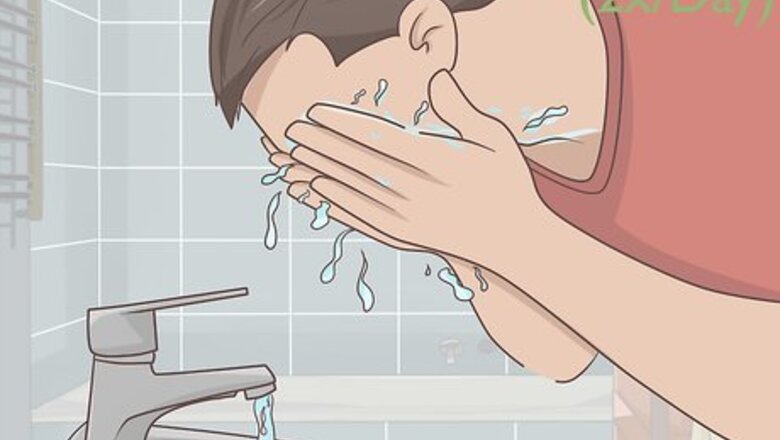
views
X
Trustworthy Source
Mayo Clinic
Educational website from one of the world's leading hospitals
Go to source
While it may feel a little embarrassing, it’s really nothing to worry about. Millions of people experience acne every year, and it’s especially common for teenagers. Keep in mind that acne is not a permanent condition and you can usually deal with it naturally, even if it takes a little more effort and attention than prescription medications. Keep in mind, if your acne keeps getting worse, begins spreading, or starts causing you pain, go see a dermatologist to determine if there are better options available.
Following a Skincare Routine
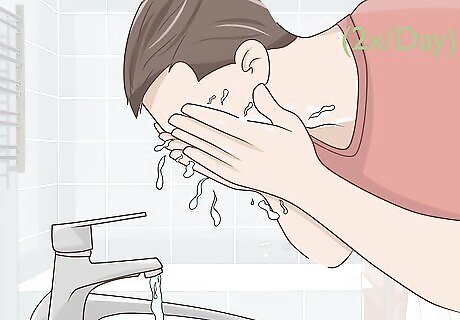
Rinse your skin at least twice a day, especially after sweating. Run lukewarm water from your sink. Scoop up the water in your hands and spread the water over your face. Then, use a clean washcloth to wipe your face. Do this at least twice a day to keep oils and dirt from building up in your skin. At least one of these face washings can be done in the shower. Simply wipe your face with the washcloth after shampooing and using soap. If you go running or play sports, go ahead and throw an extra washing in there after you’re done moving around. Cleaning the sweat off of your skin is the best way to keep acne from getting worse. It can be hard to get in the swing of doing this at first. Once you get used to washing your face twice a day, it will be easy to keep up with the routine!
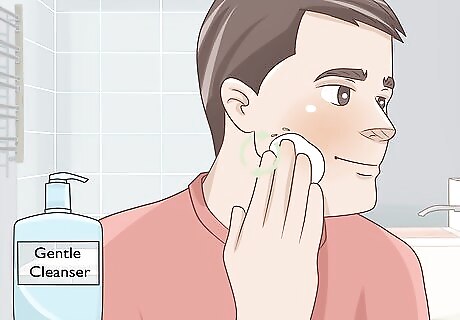
Wash your face with a gentle cleanser once a day. Do this after your first daily face washing. Squirt out ⁄4–⁄2 teaspoon (1.2–2.5 mL) of facial cleanser into your hands. Rub your cheeks with your hands to apply the facial cleanser to your face. Then, use your fingertips to work cleanser into your cheeks, nose, forehead, and chin. Rinse off the cleanser and pat your face dry with a fresh towel when you're done.Tip: There are plenty of natural cleansers on the market. Look for an organic cleanser with salicylic acid, which is an organic acid extracted from plants. It cleans your pores out and makes your face feel fresh and clean. Don’t use cleanser more than once a day. Too much cleanser can dry your skin out, which can irritate it and lead to more acne. Never use an alcohol-based cleanser. Water- and oil-based products are fine, though.
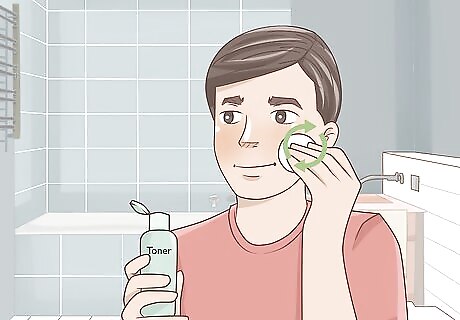
Apply toner to remove excess oil. Look for a toner made with salicylic acid or witch hazel. Squirt it on a cotton round or ball and lightly wipe the cotton over your face, avoiding your eyes, nostrils, and lips. Let the toner dry before putting on moisturizer.
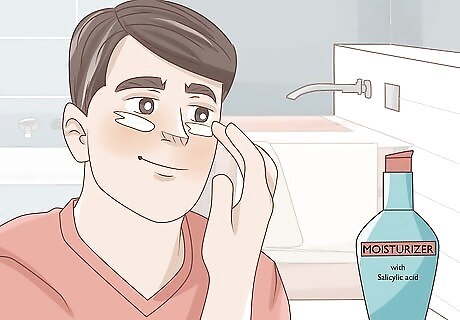
Put on a moisturizer that contains salicylic acid. When it comes to facial creams, lotions, and moisturizers, look for organic products with salicylic acid in it. Salicylic acid cleanses your pores and naturally treats inflammation caused by acne and skin irritation. Whenever your skin dries out or starts flaking, use your lotion or moisturizer to replenish your skin and fight the acne off. Keeping your skin dry and free from oils is the best way to cut down on acne. Unfortunately, if your skin gets too dry or your acne becomes painful, you’re probably better off moisturizing and treating your skin.
Treating Acne
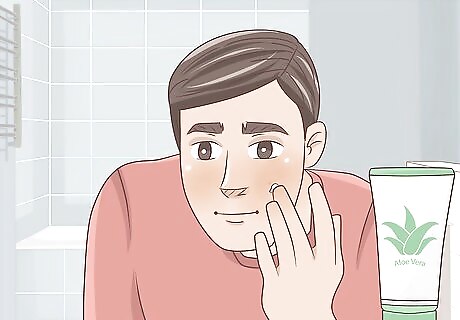
Dab aloe vera on painful acne and deeper pimples. Pick up a bottle of aloe vera at any big box store or pharmacy. If your acne hurts or you feel the pimple digging deep into your skin, rub a pea-sized drop of aloe vera directly into the affected area. Aloe vera is mentholated and it will soothe the pain and help reduce the inflammation from the acne. Aloe vera will also help your pores breathe. Be careful about applying it too close to your eyes though, since the minty fumes can make your eyes water or become irritated. Some people aren’t big fans of aloe vera. If you don’t like the minty feeling, don’t worry. You can use other products to treat your acne just as well.
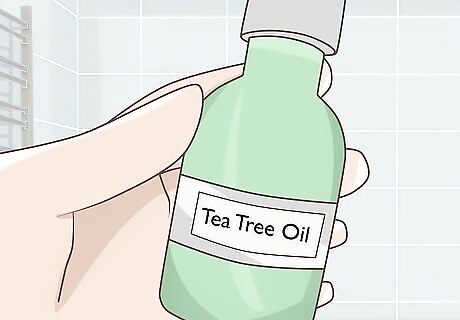
Use a tea tree oil-based product for mild cases of acne. While research is still being conducted, tea tree oil is likely very good for moderate acne. It has the ability to reduce inflammation, which can cause acne to shrink and dissipate. Purchase an organic moisturizer with tea tree oil as the main ingredient and rub a small dollop directly around the acne to reduce inflammation. Avoid putting an undiluted essential oil directly on your skin. This can cause a negative reaction and may make your acne worse.
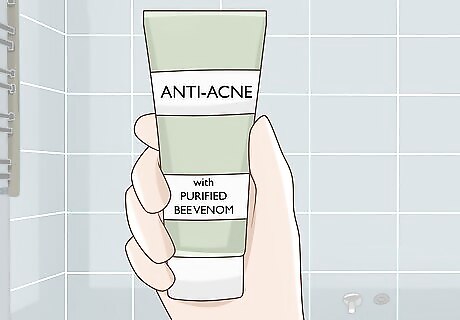
Look for products with purified bee venom to restore your skin. One of the newer discoveries is that purified bee venom can reduce the overall impact of acne. Purchase a product that uses purified bee venom as a key ingredient. Work a pea-sized dollop into your skin by hand to treat your acne. Do this daily for 3-6 weeks until the acne clears up. You cannot use bee venom if you’re allergic to bees. Purified bee venom may sound kind of freaky, but it’s a great option if you’re looking for a solid natural treatment!
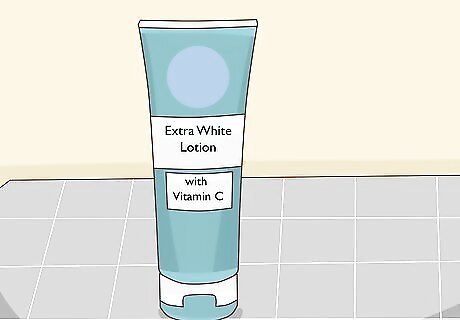
Opt for lotions with vitamin C to repair skin after your acne clears. Vitamin C has the ability to help skin naturally repair itself without introducing synthetic chemicals into your skin. Pick up a vitamin C-based moisturizer or lotion online or from your local pharmacy. After bouts of acne have cleared up, apply your vitamin C-based product to the skin. There is evidence that this will keep scars from forming and help your skin return to its original texture faster.Tip: Vitamin C will also protect your skin from ultraviolet rays, which can trigger skin reactions in some people.
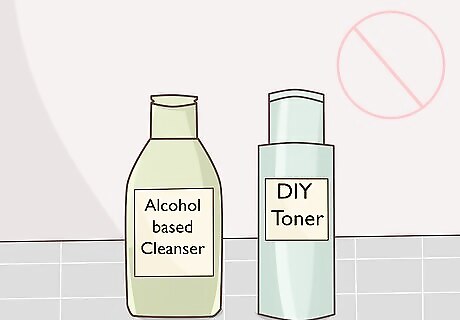
Avoid alcohol-based cleansers and DIY toners to keep your skin safe. Any cleanser or toner with alcohol in it can dry your skin out and kill the skin cells, so it’s best to avoid it. When it comes to folk remedies and DIY toners, you’re better off sticking with regulated products. Most countries regulate skincare products, but anything you mix in your kitchen could damage your skin. There is no evidence that apple cider vinegar will clear acne up. It will definitely dry your skin out, though if that’s all you’re trying to do. There is some evidence that asprin can treat acne, but it hasn’t been thoroughly studied and it’s yet to be used in many skincare products. Honey has anti-inflammatory properties and it may ease some of the pain from acne. There’s no research to suggest that it clears acne up, though.
Preventing Acne Outbreaks
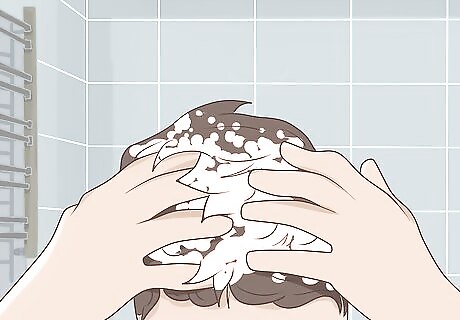
Shampoo your hair regularly to keep oils from building up. A lot of the oils that end up on your face come from your hair. Shower first thing in the morning and shampoo your hair before washing your face. This will keep the oils in your hair from getting into your face and building up in your pores.Tip: Use an oil-free shampoo with no sulfates in it if you’re trying to cut back on skin oil. Be mindful though, since your hair does need some oils to stay healthy.
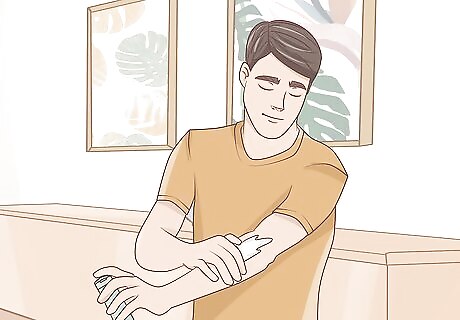
Wear sunscreen and stay out of the sun for prolonged periods. If you’re going outside, protect your skin by wearing sunscreen. Avoid spending more than 30-45 minutes out under the sun per day. The sun can trigger skin reactions for people prone to acne, and it will also interfere with any other skincare products you’re using to treat your acne. Try to avoid sunscreens that are really oily. There are a handful of sunscreens that are designed specifically for sensitive skin, which may be ideal for you. The sun also makes you sweat, which can lead to more acne outbreaks.
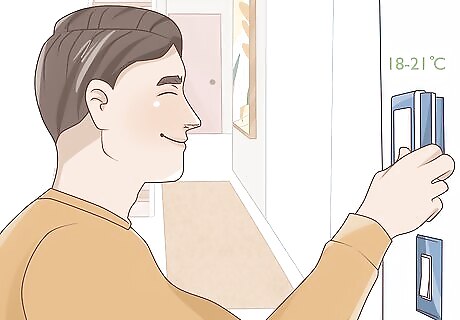
Turn the temperature down in your home and take cooler showers. Heat and hot water cause you to sweat. When you sweat, the minerals and dirt on your skin get carried all over the place. This can lead to clogged pores or oily skin. Keep the thermometer under 65–70 °F (18–21 °C) if you can and keep the water temperature a little cooler when you shower or bathe. Avoid wearing hats as well. Wearing something on your head can cause your forehead to sweat.
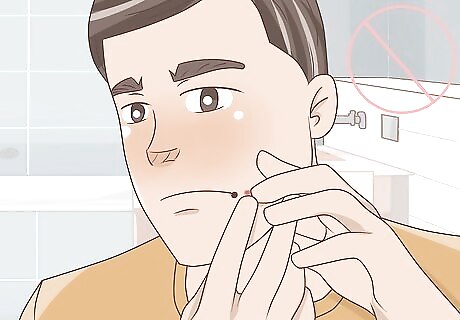
Let your acne heal naturally and avoid popping or touching the pimples. As tempting as it may be, fiddling with your acne can cause it to stick around for longer. Let your skin heal naturally and never pop your pimples. If you do, you could end up scarring your skin and increase the odds that your acne comes back in the future.
When to Seek Medical Care
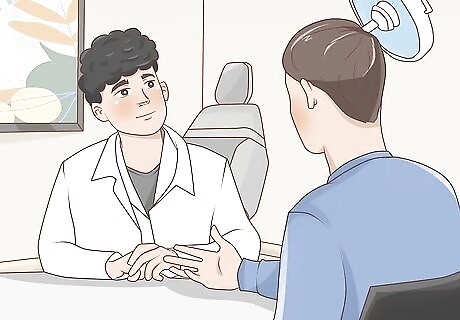
See a dermatologist if your acne doesn’t improve after 4-8 weeks. You can typically treat mild-to-moderate acne at home, but it usually takes 4-8 weeks to see results. If your acne doesn’t improve after a month, it’s possible you need additional treatment. Talk to your dermatologist to learn about your treatment options so that you can get clearer skin. The dermatologist may recommend trying over-the-counter treatments before you try a prescription treatment. You can discuss your acne with your primary doctor, but a dermatologist will have more experience treating skin conditions.
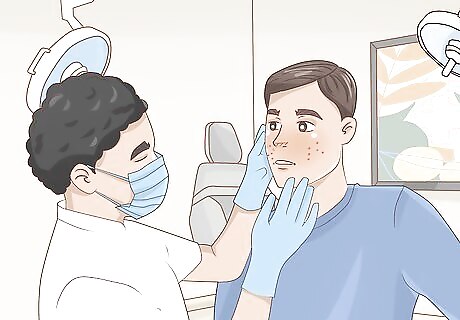
Visit your dermatologist if you have cystic or nodule acne. Cystic and nodule acne is bright red, and may look like boils or wounds on your face. These types of acne are more severe and often causes scarring. Additionally, cystic and nodule acne forms deep under your skin, so it often doesn’t respond to topical treatments. Talk to your dermatologist to find out if you need an oral treatment for your acne. Then, ask them how you can best care for your skin. Your dermatologist may prescribe you an oral antibiotic to treat your acne from the inside. Additionally, your dermatologist may prescribe you oral contraceptives if your acne is caused by hormonal fluctuations.
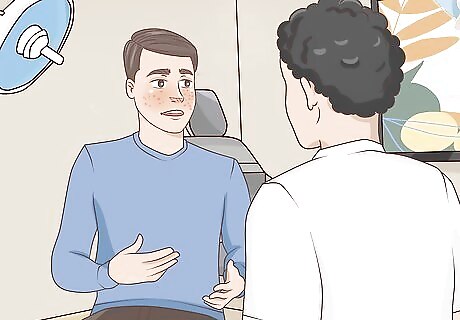
Consult your dermatologist if you have widespread acne. While you might be able to get rid of widespread acne with natural treatments, sometimes you need a stronger treatment to help manage your acne. See a dermatologist to find out if you need a stronger treatment. They may recommend you take an oral antibiotic to get your acne under control. You may be able to switch back to your natural skincare routine after you get your acne under control.
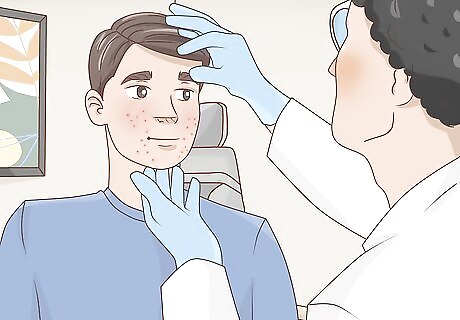
Talk to your doctor immediately for sudden onset of adult acne. While you likely don’t need to worry, a sudden outbreak of acne during adulthood can be a symptom of a serious illness. Fortunately, your doctor can determine if you have an underlying medical condition that needs treatment. Visit your doctor immediately to find out if you need treatment. You’re probably okay, but it’s best to get checked by your doctor to be sure.
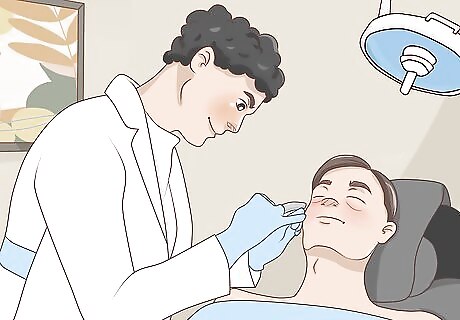
Get immediate medical care for an allergic reaction to your treatments. While it’s rare, it’s possible to have an allergic reaction to your natural treatments. If this happens, you need immediate treatment. Call your doctor or visit an urgent care center or emergency room if you have an allergic reaction. Seek medical help if you have: Swelling in your face, lips, and eyes. Difficulty breathing. Tightness in your throat. Fainting or dizzy spells.




















Comments
0 comment